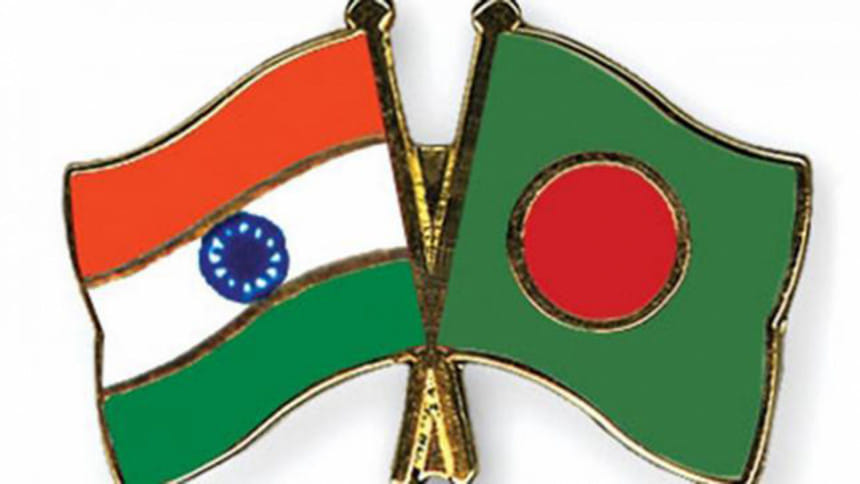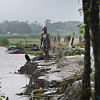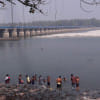Teesta Failure: Focus now on deals for 6 small rivers

Following failure to sign agreements on the Teesta and Feni rivers, Dhaka and Delhi are now stepping towards a new deal on six small rivers and optimum use of the Ganges water treaty.
The six rivers are Manu, Muhuri, Khowai, Gumti, Dharla and Dudhkumar, officials said, adding that all the 54 transboundary rivers of the two countries would eventually come under the framework agreement.
“We have collected data on these six rivers for preparing the framework agreement,” said member of a technical committee, formed following a secretary-level Indo-Bangla meeting early August.
The agreement will be discussed during Prime Minister Sheikh Hasina’s ongoing visit to New Delhi where she is scheduled to meet her Indian counterpart Narendra Modi and co-chair the Indian Economic Summit being held on October 3-4.
The agreement, however, will not be signed this time, said officials.
In 2011, Bangladesh and India failed to sign the Teesta water-sharing agreement due to West Bengal Chief Minister Mamata Banerjee’s last-minute opposition during the then Indian Prime Minister Manmohan Singh’s visit to Dhaka.
Even today, the issue remains unresolved.
In such a situation, farmers in Bangladesh’s northern region depend heavily on underground water for irrigation.
Though the two countries have 54 rivers in common, treaty on water sharing was signed only on one river -- the Ganges -- in 1996.
Dhaka is frustrated over the Teesta issue, especially when it has allowed transit facilities for transportation of Indian goods from one part of India to another through Bangladesh.
Also, Dhaka addressed Delhi’s most important concern by not sheltering any Indian insurgents -- something that facilitate stability in India’s Northeastern region.
Against this backdrop, Indian Water Resources Secretary Upendra Prasad Singh flew to Dhaka early August to attend a secretary-level meeting on water sharing.
Indian External Affairs Minister Dr S Jaishankar also met his Bangladeshi counterpart Dr AK Abdul Momen in Dhaka late August when the water issue prominently came up for discussions.
The secretary-level meet also discussed forming two technical committees -- one on conducting feasibility study on the optimum use of water received under the Ganges treaty and the other on data collection of the six rivers.
The member of a technical committee told The Daily Star on October 2 that the committee had collected information on the water flow of the rivers. Soon, they would meet their Indian counterpart to exchange similar data.
“The agreement will be prepared based on the data,” the water expert said. “We are looking at how we can modernise our system of flood forecasting by sharing of water flow data,” he added.
The two countries are also working on curbing pollution of the common rivers and “sharing the best practices” with each other, the official said, requesting anonymity.
Talking about the Ganges treaty, he said the technical committee was working on finding ways of making the optimum use of the water that Bangladesh receives from India.
“During lean season, there is a serious problem of salinity intrusion in Bangladesh’s south-west region. We are studying the options. It may be building barrage or dredging rivers that can help prevent salinity intrusion,” the committee member added.
The technical committee of India will study the issue in the Indian part, he added.
Asked if Dhaka and Delhi were considering basin-wide management of common rivers, the expert said it was not fully basin management, but there were specific activities that are elements of basin management.
Eminent water expert Dr Ainun Nishat said basin-wide river management involves management of sedimentation, sharing water and flood forecast data, checking pollution, and addressing the challenges of livelihoods of the people of the river basins.
Bangladesh and India are supposed to go for such basin-wide management, but the two countries are nowhere near it. There has also been serious lack of progress on water sharing, he added.
“There were ample high-level visits between both the countries, but there’s little progress. This is frustrating,” he told The Daily Star.
“There are disputes over water sharing among the Indian states themselves. Therefore, Bangladesh, being a lower riparian country, should have the urge to address the water issues,” said Ainun Nishat, a former member of Indo-Bangla Joint River Commission.
Prof Dr Rasheduzzaman of international relations at Dhaka University said water was going to be the most important issue in the coming decades.
“It has to be looked at from the climate change point of view because the global temperature is rising. The Himalayas are melting too,” he said.
So, all the countries of this region, including China, Nepal, Bhutan, India and Bangladesh, must cooperate with each other and go for a regional management of water, Prof Rasheduzzaman added.

 For all latest news, follow The Daily Star's Google News channel.
For all latest news, follow The Daily Star's Google News channel. 








Comments